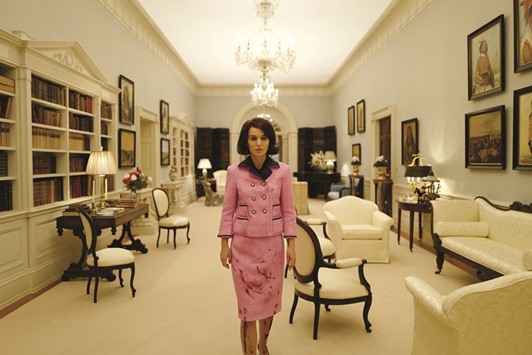On November 22, 1963, Jacqueline Kennedy went from being an elegant celebrity to a figure of national tragedy, a vulnerable woman of strength in an era when strong women were not acknowledged. In Jackie, Natalie Portman plays the role of America’s most famous first lady in the immediate aftermath of John F. Kennedy’s assassination in Dallas. Directed by Chilean filmmaker Pablo Larrain and produced by Darren Aronofsky (who guided Portman to an Oscar in Black Swan), it puts her centre-stage throughout the days following one of the most shocking events in US history.
Portman’s Jackie is a complicated figure, her varied anxieties, concerns and conflicts washing over a woman who had lost two infants — and now her husband and their beloved official home. Her extraordinary enactment is one of those special events of performance where, as you’re being swept away by the stunning drama, passion and tragedy of it, a part of your mind is thinking “Oscar contender.”
In a recent phone conversation, Portman said Aronofsky had seen her five or six years ago as the ideal actress to capture that cultivated, reserved and mysterious persona.
“I thought it was a great script, but in the wrong hands, if it was directed by someone too idolising of Jackie, it could turn into something maybe not as interesting,” she said. But Larrain, making his English-language debut, was interested in looking into her humanity and telling an American historical story with the benefit of an outside perspective.
“It is really a leap of imagination,” she said. “He is just a visionary as a filmmaker, and because he comes from Chile, he doesn’t have this way of thinking about the Kennedys as our royalty. He’s more willing to try things that are unorthodox or maybe even taboo to think about. He just has a different way of thinking than anyone else. I would never think of those things myself. “
The film’s focus shows the new widow in a period of post-traumatic shock, simultaneously planning JFK’s funeral procession and working to memorialise his legacy, juxtaposing historic images from Jackie’s televised guided tour of the White House and her limousine speeding to the hospital from the fatal motorcade, his head in her lap.
Portman was pleased that, while the events on-screen are quite well-documented, the film is a work of imagination.
“What actually was said in those rooms, none of us know. Her comments from the interview she did directly after the assassination (with Life magazine journalist Theodore H. White), some of those are verbatim. Everything else is creative licence.
“We didn’t do anything that was blatantly against what really went on,” she said. “There are documents that show she was asking advice from a priest, that she had considered suicide, that she was questioning her faith. She was getting paranoid about what would happen to her, where she would go, how she would live and support herself,” which the film dramatises from accounts documented by people who were around her at the time.
Unlike Daniel Day-Lewis in Lincoln, Portman did not go into 24-hour Jackie mode to live the role.
“I think as a mother, there’s no way you can do that. Your kid isn’t going to appreciate it when you come home for dinner like that. I feel grateful that I have my life to go back to after doing stuff that harrowing. When you are a mom, you have to be more flexible and leave work at work.” (Portman and her husband, choreographer Benjamin Millepied, have a five-year-old son and are expecting their second child.)
To prepare for the role, she dug deep into biographies and historical accounts of the time.
“There’s so much out there, I was really lucky to have that much background information at my fingertips,” she said. “There were so many videotapes, interviews, audiotapes, books. A great deal to draw from was really useful because normally you have to come up with things by yourself.”
In that process, she said, she felt a deeper understanding of who this famous yet largely unknown person was.
“It is shocking that someone so iconic is so mysterious at the same time. We really have this two-dimensional impression of her, I feel, like the Andy Warhol silk-screen. What we think about her has about as much depth. To consider her humanity was amazing, to consider how smart she was. She knew every name of every person who interacted with Kennedy, what their aims were, what their opinions were and how they interacted, what their goals were.
“And she was not invited into political discussions at all. It was what she was gleaning from being outside the door.
“She was so sharp and had such a memory and aptitude for it. She was a real scholar of history. JFK had her translate three books from French to English about Indochina” to help him understand what was going on in Vietnam.
“It gave her the insight to understand that the story that is told is much more important than what actually occurred,” she said. “Writing a compelling myth is much more what history writing is about than trying to be accurate about what happened.” — Star Tribune (Minneapolis)/TNS
Community / Culture
“I feel grateful that I have my life to go back to after doing stuff that harrowing”

STAR-TURN: Natalie Portman as Jackie Kennedy in Jackie.
